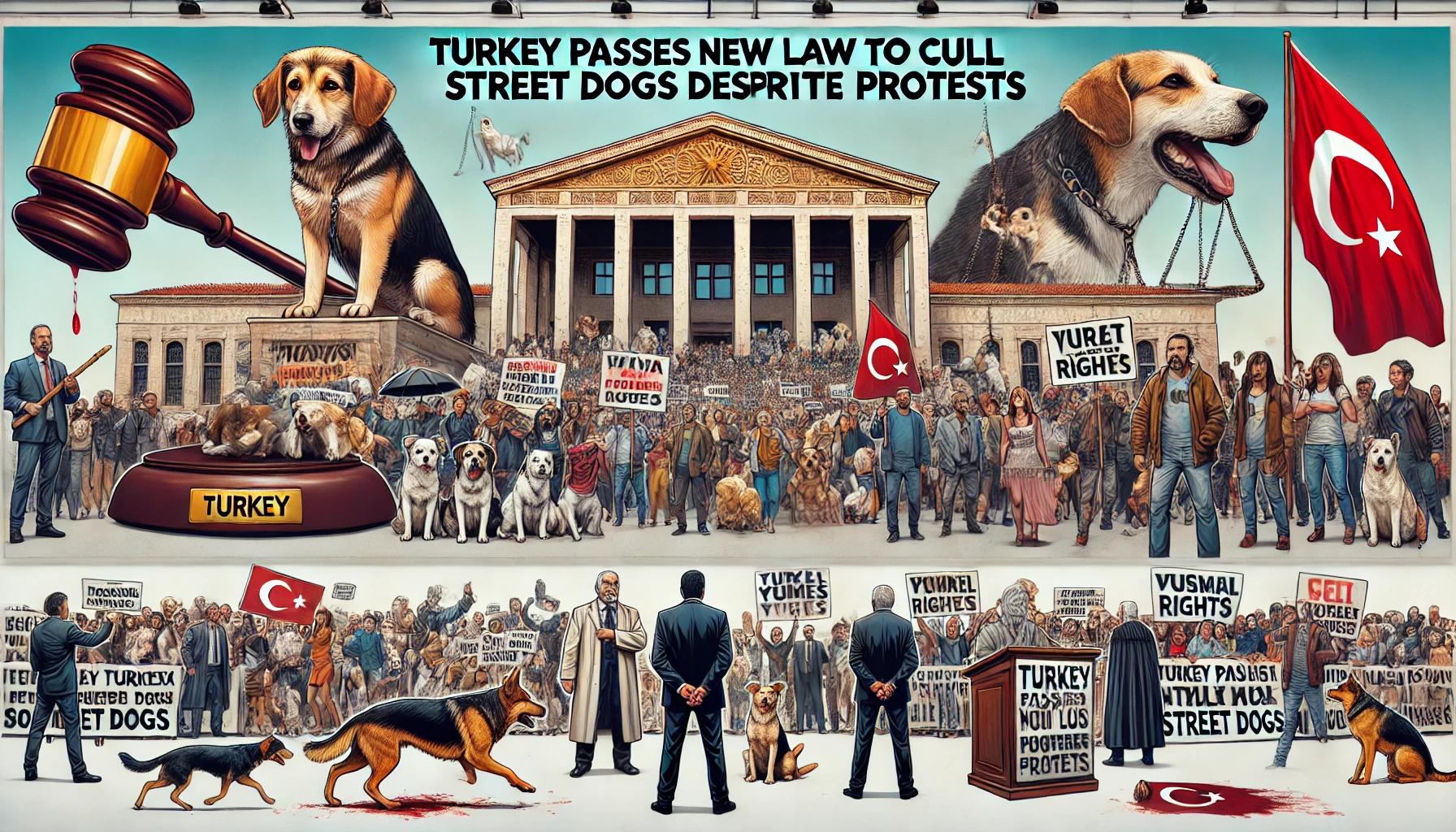Culling Street Dogs a new law in Turkey: What It Means and Its Implications
Turkey has recently made headlines with the announcement of a new law aimed at culling street dogs despite widespread protests. This controversial decision has sparked debates across the nation and garnered international attention. The move to implement this law, aimed at addressing the growing issue of stray dogs, has divided public opinion, leading to significant protests and raising questions about animal rights and the effectiveness of such measures.
The New Law: Objectives and Details
Overview of the Law
The new law to cull street dogs in Turkey was passed with the intent to control the burgeoning population of stray dogs, which has been a persistent issue in many urban areas. Supporters of the law argue that it is a necessary step to ensure public safety and hygiene, as stray dogs have been associated with several health risks and safety concerns.
Key Objectives:
- Public Safety: Reduce the number of stray dogs to prevent dog attacks and ensure the safety of residents.
- Health and Hygiene: Address the spread of diseases that can be transmitted by stray dogs.
- Urban Management: Manage the stray dog population in urban areas to maintain cleanliness and order.
Implementation and Measures
The implementation of the new law involves specific measures and procedures to humanely cull street dogs. The government has outlined a detailed plan to carry out these actions in a controlled and regulated manner.
Measures Included:
- Identification and Capture: Stray dogs will be identified and captured by designated authorities.
- Evaluation: Captured dogs will be evaluated for health and potential for adoption. Healthy and adoptable dogs will be sent to shelters.
- Euthanasia: Dogs deemed unadoptable due to health issues or aggressive behavior will be humanely euthanized.
Protests and Public Reaction
Nationwide Protests
The announcement of the new law to cull street dogs has led to widespread protests across Turkey. Animal rights activists, citizens, and international organizations have voiced their concerns and opposition to the law, arguing that it is inhumane and ineffective.
Protest Highlights:
- Mass Gatherings: Large protests have been organized in major cities, with participants calling for the repeal of the law.
- Social Media Campaigns: Activists have taken to social media to raise awareness and mobilize support against the culling of street dogs.
- Petitions: Numerous petitions have been launched, garnering thousands of signatures from people who oppose the law.
Key Arguments Against the Law
Opponents of the new law argue that culling street dogs is not only inhumane but also ineffective in addressing the root causes of the stray dog population. They advocate for alternative solutions that focus on animal welfare and long-term population control.
Main Arguments:
- Inhumane Treatment: Euthanizing healthy dogs is seen as a violation of animal rights.
- Ineffectiveness: Culling does not address the underlying issues such as uncontrolled breeding and lack of spaying/neutering programs.
- Ethical Concerns: The ethical implications of culling animals have been widely debated, with many viewing it as a morally unacceptable practice.
Animal Rights and Ethical Considerations
Animal Rights Protests
The law has sparked a significant response from animal rights organizations both within Turkey and internationally. These groups have been at the forefront of protests and advocacy efforts to protect street dogs and promote humane treatment.
Organizational Efforts:
- Campaigns: Organizations are running campaigns to educate the public about the implications of the law and advocate for its repeal.
- Rescue Operations: Efforts to rescue and rehome street dogs have intensified, with shelters and rescue groups working tirelessly to save as many dogs as possible.
- Legal Actions: Some groups are exploring legal avenues to challenge the law and prevent its implementation.
Ethical Perspectives
The ethical debate surrounding the culling of street dogs involves complex considerations about animal welfare, public health, and societal values. The ethical arguments often highlight the need for compassionate and sustainable solutions.
Ethical Considerations:
- Animal Welfare: The welfare of animals should be prioritized, with humane treatment and care being fundamental principles.
- Sustainable Solutions: Long-term solutions such as spaying/neutering programs and public education about responsible pet ownership are seen as more effective and humane.
- Balancing Interests: Ethical solutions must balance the interests of public safety, health, and animal rights, ensuring that no group is disproportionately affected.
Alternative Solutions and Global Perspectives
Effective Alternatives to Culling
Many experts and animal rights advocates propose alternative solutions to manage the stray dog population that do not involve culling. These solutions focus on long-term strategies that address the root causes of the issue.
Proposed Alternatives:
- Spaying/Neutering Programs: Implementing widespread spaying and neutering programs to control the population growth of street dogs.
- Adoption Initiatives: Promoting adoption and fostering of stray dogs to reduce the number of animals on the streets.
- Education Campaigns: Educating the public about responsible pet ownership and the importance of spaying/neutering pets.
Global Perspectives on Stray Dog Management
Different countries have adopted various approaches to managing stray dog populations, offering valuable insights and potential models for Turkey to consider.
International Approaches:
- India: Extensive spaying/neutering programs and community engagement have been key strategies in managing stray dog populations.
- Romania: Collaboration with international animal welfare organizations has led to successful adoption and sterilization campaigns.
- Italy: Implementing no-kill policies and focusing on adoption and public education to manage stray dogs humanely.
Conclusion
Turkey passes new law to cull street dogs despite protests, leading to significant public outcry and raising important ethical and practical questions. While the law aims to address issues related to public safety and health, it has been met with widespread opposition from animal rights activists and concerned citizens. The ethical considerations and the potential for more humane and effective alternatives underscore the need for a comprehensive approach to managing the stray dog population.
As the debate continues, it is crucial to consider the welfare of animals and explore sustainable solutions that balance the interests of all stakeholders. For more insights and educational resources on this topic, visit Regent Studies. Understanding the complexities of animal rights and public health can help inform better policies and practices that benefit both humans and animals.
In addressing the issue of stray dogs, it is essential to move beyond immediate measures and focus on long-term strategies that promote animal welfare and public safety. The ongoing protests and discussions highlight the importance of ethical considerations and the need for compassionate approaches to managing street dogs in Turkey. By exploring alternative solutions and learning from global perspectives, we can work towards a more humane and effective approach to this pressing issue.




